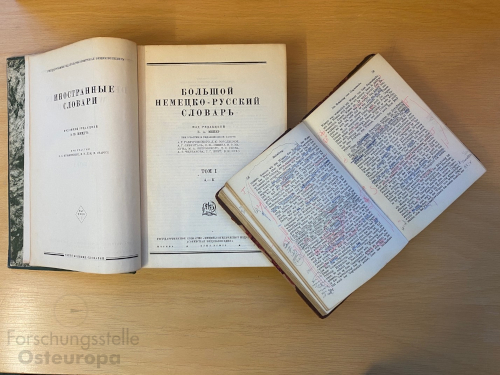Kolloquiumsvortrag
18:15 Uhr, / Zoom
Benjamin Goossen (Boston)
Mennonites and Lebensraum. Situating a Christian Denomination in Hitlers Empire.
Wissenswertes
The dialogue of cultures forbidden in the Soviet Union. The role of the German-Russian dictionary in the fate of the philosopher Gustav Shpet.

The Great Russian-German Dictionary (left) and Hegels “Phänomenologie des Geistes" with Shpet's notes (right). Archive of the Research Centre for East European Studies, Photo: Lev Polivanov.
The war that Putin unleashed against Ukraine is going on for more than a year and a half now. And for even longer, the repression of dissenters in Russia has been increasing year by year. In these difficult times, representatives of the social sciences often face the question - what exactly can they do to help, what can they do to prevent the tragedies we see today from happening in the future? In my opinion, the most important contribution of the humanities to solving these kinds of problems is to help to find mutual understanding between different peoples and countries, to establish a dialogue of cultures and the transfer of ideas.
As archival document of the month, I chose the first and only published volume of the “Great Russian-German Dictionary”, was compiled by Elisabeth Meyer, Gustav Shpet, Alexander Gabrichevsky, Mikhail Petrovsky, Boris Yarkho, Georgy Chelpanov and others in 1934. It is kept in the FSO archive and belonged to Gustav Shpet.
One year later in 1935, the compilers of the dictionary faced the following accusation: "The Great German-Russian Dictionary is littered with religious-mystical words, various archaisms, words of old German culture." Shpet, Meyer, Petrovsky, Chelpanov were shot, Yarkho died of tuberculosis a few years after the camp, Gabrichevsky alone was released alive after a conditionally "soft" exile. Many employees of the publishing house "Soviet Encyclopaedia", the Academy of Sciences and former employees of the State Academy of Art Sciences were also convicted in the same case.
I find this case very eloquent. It shows how absurd and terrible the accusations can be. And the main thing is that the activities of people whose aim is to bring the two cultures closer together, to exchange knowledge and traditions are under attack. Here it is not even so important how consciously or unconsciously a culture is destroyed. What matters is that in militaristic authoritarian and totalitarian societies, even something as far from politics as translation can become illegal. It cannot be said that the dictionary itself is such a unique source for Shpet's biography. But it is indeed a vivid testimony to his tragic fate. After being exiled to Tomsk, Shpet was shot on 16 November 1937.
Even today Gustav Shpet is recognised by many as one of the best translators of Hegel into Russian. Next to the dictionary is a volume of "Phänomenologie des Geistes" with Shpet's notes, which is also kept in the FSO archive.
This dictionary was brought by me exactly one year ago from our family archive and transferred to the 01-137 Baranovich and Polivanov collection. It has an important symbolic meaning for me as well. When Gustav Shpet in the 1920s faced the choice of emigrating or staying in Russia, he chose to stay. A hundred years later, I had to make the same choice. But I chose to leave.
Lev Polivanov
Further reading:
Yakovich, Elena: Doch' filosofa Shpeta v fil'me Eleny Yakovich. Polnaya versiya vospominanij Mariny Gustavovny Shtorh, Moscow 2015.
Gejvandov, Armen: Delo fashizirovannogo slovarya, https://diletant.media/blogs/60957/42892580/?ysclid=ln4q3bb146350063545, 2018 [28.09.2023].
Lev Polivanov is a visiting scholar at the Research Centre for East European Studies Bremen.
Länder-Analysen
» Länder-Analysen
» Eastern Europe - Analytical Digests
Discuss Data
Archiving, sharing and discussing research data on Eastern Europe, South Caucasus and Central AsiaOnline-Dossiers zu
» Erdgashandel
» Hier spricht das Archiv
» Russian street art against war
» Dissens in der UdSSR
» Duma-Debatten
» 20 Jahre Putin
» Protest in Russland
» Annexion der Krim
» sowjetischem Truppenabzug aus der DDR
» Mauerfall 1989

